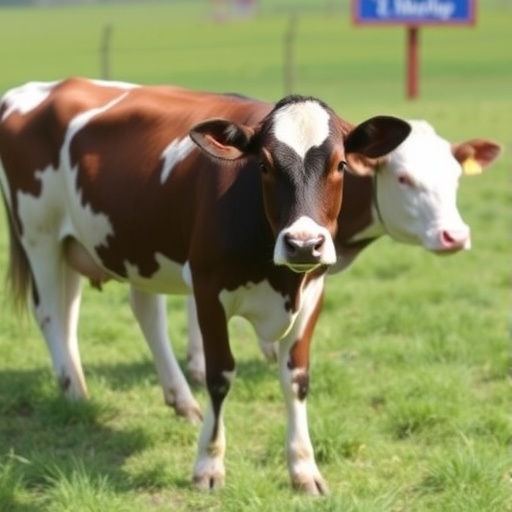In the world of agricultural science, cattle nutrition is an integral subject that directly influences livestock productivity, sustainability, and environmental impact. The recent study conducted by de Almeida Rufino and colleagues sheds light on the complex interactions between nitrogen supplementation and the performance of cattle fed medium-quality tropical forage. This research not only addresses practical farming concerns but also delves into the intricate metabolic processes at play in ruminant nutrition.
The study, published in the journal Discover Animal, focuses on the effects of both the amount and frequency of nitrogen supplementation. These aspects are crucial as nitrogen is a vital component in animal diet, influencing protein synthesis, growth rates, and overall health. The research seeks to optimize not only cattle health but also overall farm productivity and efficiency, presenting an essential contribution to sustainable agriculture.
Cattle raised on tropical pastures often face nutritional challenges due to the inherent limitations of the forage provided. The quality of tropical grasses can vary significantly, affecting the digestibility and nutrient availability. As a result, farmers are constantly searching for effective means to enhance the nutritional profile of cattle feed. In this context, nitrogen supplementation emerges as a promising solution. However, understanding how to effectively implement this practice requires extensive research into various supplementation strategies.
The research outlines that the nitrogen supplementation must be tailored to cattle’s dietary needs and environmental conditions. Through methodical experimentation, the authors managed to identify optimal nitrogen levels that improve not only the nutritional performance of the livestock but also their metabolic efficiency. This dual focus ensures that cattle not only grow faster but also utilize nutrients more effectively, reducing waste and enhancing feed conversion ratios.
Moreover, the frequency of nitrogen application plays a critical role in influencing how well cattle can utilize the nitrogen provided. The study revealed compelling evidence that strategically timed nitrogen supplementation could lead to marked improvements in cattle performance metrics, including weight gain and milk production. By examining various frequencies of nitrogen application, the researchers were able to determine an optimal schedule that maximizes the benefits without leading to detrimental effects such as nitrogen wastage or adverse environmental impacts.
In the context of climate change and increasing food security concerns, optimizing cattle nutrition is more relevant than ever. The findings of this research could serve as a framework for farmers across tropical regions seeking to improve their livestock’s health and productivity. This optimization not only promises improved yields but also sets the stage for more sustainable practices within the industry, offering a pathway to reduce reliance on non-renewable resources.
One key takeaway from this study is the critical importance of ongoing research in agricultural sciences. As the demands for efficient food production rise, science must adapt and innovate to meet these challenges. The insights gained from this work can ultimately shape future policies and practices, pushing for an approach that balances productivity with environmental stewardship.
Additionally, the interactions between nitrogen and other dietary components are ripe for further exploration. As the understanding deepens, future investigations might reveal additional synergistic effects that further enhance the nutritional value of cattle diets. This could lead to groundbreaking practices that redefine current standards in livestock management.
Furthermore, the implications of this research extend beyond the immediate context of cattle farming. By embracing more efficient nitrogen utilization, farmers can potentially mitigate the negative consequences associated with excess nitrogen runoff, a significant environmental concern. The findings from de Almeida Rufino et al. not only benefit individual farmers but also contribute to broader ecological sustainability goals.
Given the complexity of livestock nutrition and environmental factors, collaborations between researchers, farmers, and policymakers will be essential moving forward. The shared insights derived from combined efforts can facilitate the development of innovative strategies that ensure both the prosperity of farmers and the health of our ecosystems.
This groundbreaking research exemplifies the future of beef and dairy production, emphasizing the necessity of embracing scientific advancements to meet the needs of a growing population. With innovative approaches such as those outlined in this study, it is possible to create a more balanced, healthy, and sustainable future in livestock management.
As the agricultural community continues to navigate the challenges of modern farming, research studies like this are invaluable in guiding the path ahead. With expert knowledge and practical application, the potential for improved practices that promote health and productivity in cattle is immense.
Moving forward, the agriculture sector is encouraged to leverage such findings and adapt practices that are informed by scientific inquiry. The journey towards achieving maximum efficiency and sustainability in livestock production will undoubtedly benefit from the insights garnered from the effects of nitrogen supplementation outlined in this research.
In conclusion, this comprehensive study not only offers crucial insights into the specifics of nitrogen supplementation in cattle nutrition but also reinforces the importance of continual research in ensuring agricultural sustainability. As farmers and scientists work together, they can cultivate a more resilient and productive agricultural landscape for future generations.
Subject of Research: Effects of nitrogen supplementation on cattle nutrition and metabolism.
Article Title: Effects of amount and frequency of nitrogen supplementation on nutritional performance and metabolism in cattle fed medium-quality tropical forage.
Article References:
de Almeida Rufino, L.M., Rodrigues, J.P.P., de Oliveira Franco, M. et al. Effects of amount and frequency of nitrogen supplementation on nutritional performance and metabolism in cattle fed medium-quality tropical forage.
Discov Anim 2, 39 (2025). https://doi.org/10.1007/s44338-025-00095-6
Image Credits: AI Generated
DOI:
Keywords: Nitrogen supplementation, cattle nutrition, tropical forage, livestock productivity, sustainable agriculture.
Tags: agricultural science innovations for cattle farmingcattle nutrition and environmental sustainabilityenhancing digestibility of cattle feedfrequency of nitrogen supplementation in cattleimpact of nitrogen on ruminant metabolismimproving livestock performance through supplementationnitrogen supplementation in cattle nutritionnutritional challenges in tropical pasture cattleoptimizing cattle productivity and efficiencyrole of nitrogen in protein synthesissustainable agriculture practices for livestocktropical forage quality and cattle health





